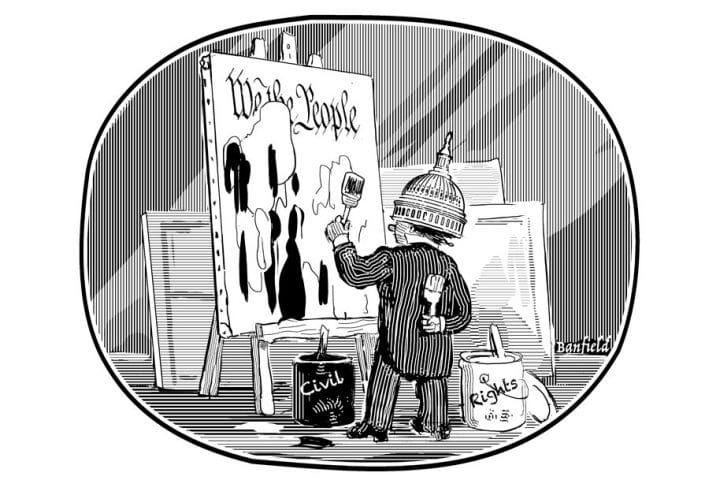Books Reviewed
In telling the history of a great event, every writer makes choices about what he or she believes should matter to readers. The ongoing debates on the Right between liberals and post-liberals—labels that have recently been used in the exchanges between David French and Sohrab Ahmari—concerning the nature of the American Founding bring this into sharp focus. For post-liberals who think this nation was forged out of its citizens’ commitment to virtuous self-government and intense religious faith, America is a band of brothers and sisters, worthy of sacrifice and love. Liberals tend to distinguish more sharply between private life and pluralistic civil society, on the one hand, and the state, on the other. One’s view of the founding and its history determines one’s feelings toward the regime. In America’s Revolutionary Mind, C. Bradley Thompson sets out to offer a defense of our nation’s underlying philosophy from a perspective which seems different from either of those. According to Thompson, a professor at the Clemson Institute for the Study of Capitalism, America owes its founding ideals and ideology almost entirely to one man: John Locke.
Thompson begins with some methodological stipulations which are not only sensible but long overdue. To take the past seriously, he argues, we must study ideas and motives as important causes of events. This practice, which he calls the “new moral history,” promises to “[put] the thinking back into ideas, the judgment back into intentions, and the volition back into actions.” Some parts of the book do so wonderfully. Thompson’s exploration of the colonists’ anguished attitudes toward slavery draws out ambiguities and tensions in the founders’ own thought. There emerges a fascinating picture of Southern elites torn between their moral convictions and the practical realities of political and economic life. At the founding, most Southerners were convinced of slavery’s wickedness, and none of them attempted to muster a positive defense of the practice—though most kept their slaves despite their guilty consciences. Thompson does a fine job tracing the development from this early reticence to the pro-slavery mindset of the 1830s and onward. He identifies the damning moral and metaphysical links between this Confederate defense of slavery and later movements toward pragmatism, historicism, and socialism in America.
The irony here is that the best parts of the book are also the most distant from its main argument. Any study of American political thought and practice leading up to the Revolution can plausibly point to places where John Locke’s ideas influenced events. But Thompson makes a bolder claim: that it is possible to reconstruct “a near-unified system of thought” from the texts of the American revolutionary period; that the American mind it produced was Lockean; and that we can and should understand the Declaration of Independence and all that came after in unqualifiedly Lockean terms. To advance this view, Thompson presents evidence from pamphlets, sermons, and letters—most of them written by 20 or so central figures of the 18th-century Atlantic world. Yet despite this impressively wide range of primary sources, America’s Revolutionary Mind remains closed to the possibility that those who embarked on the American experiment held deeper or more diverse convictions than those espoused in Locke’s writings. This central resolve colors everything else.
* * *
The extent of Thompson’s epistemic closure is breathtaking. He argues that “America’s revolutionary mind is virtually synonymous with John Locke’s mind” and that the “American revolutionaries were unadulterated Lockeans.” In his telling, all of the most important figures “rejected the Aristotelian-Christian view that saw nature teleologically.” They joined the leading minds of the Enlightenment in spurning “faith, revelation, mystic insight, innate ideas, and a priori speculation.” In short, Thompson makes the strongest possible claim that the real motives behind the Revolution were secular and philosophical rather than religious.
* * *
You would hardly know from reading America’s Revolutionary Mind that, while church attendance declined somewhat over the course of the 1700s, around 71-77% of Americans were still active members of a faith in 1776. The Continental Congress regularly issued proclamations of fasting and supplication, and at the time of the Revolution, only one of 13 states (Virginia) lacked a religious test for public office. As late as 1791, most of them still required one. I mention these facts not to argue that Locke had no place in the American mind—his ideas clearly made an impression on America’s revolutionaries—but to point out that the Revolution ran deeper than any one man’s thought.
Despite having read and cited many political sermons, Thompson insists that “most Revolutionary Americans argued that the moral law of nature is known by right reason and not through revelation,” as if most Christians of the Revolution wouldn’t have thought these were compatible positions. Thompson admits that many revolutionaries were Christians, but he seems to want to argue that they were of a very peculiar sort: seemingly faithful churchgoers who nevertheless covertly rejected orthodox Christian teaching on the relationships among faith, reason, morality, and politics. And so he endorses a radical opposition between faith and reason where many thinkers of the Scottish Enlightenment and revolutionaries of the Reformed tradition—to say nothing of Catholics—would see none.
For Thompson, the self-evident truths of the Declaration cannot be those of natural law, nor do they bear much relation to the long natural law tradition. But are we to believe that the same people who listened to political sermons were more convinced by Enlightenment epistemology than by belief in common grace? Or that “[t]he Declaration’s self-evident truths were actually discovered, developed, formulated, and validated throughout a fifteen-year period from 1760–1775”? Were they not rather underlain by a much deeper tradition of political, philosophical, legal, and theological reasoning? At times Thompson attributes to early Americans views exceeding even those of Locke himself: he argues that the founders embraced a philosophy of complete “self-ownership” and aimed to live “fully sovereign” lives. But even Locke placed this sense of personhood firmly under the constraint of God’s role as creator and author in one of the works that most directly influenced the founding, the Second Treatise on Civil Government. In Locke’s view, for example, no man may commit suicide or sell himself into slavery, because each man is made in God’s image.
* * *
Thompson’s arguments therefore lack a holistic sense of the period’s prevailing intellectual trends. He tells us that “[t]he use and meaning of equality in the Declaration must first be seen in its broader philosophical context,” one that “begins, per usual, with John Locke.” Yet a Christian conception of moral equality before God appeared well before Locke exerted any significant influence upon the American colonies. The Puritan experiment in New England shows this: from the founding of the Massachusetts Bay Colony, every inhabitant was eligible to present bills to the general court. As early as 1647, even non-freemen over the age of 24 enjoyed the right to vote in town meetings. After 1647, non-freemen could be elected to serve as constables, jurors, or other offices—all of which suggests an even stronger conception of equality than Locke himself endorsed.
Whereas Thompson asserts that Lockean influence made the American mind, we would do better to state that a largely Christian people adopted Locke’s ideas without feeling compelled to do so in terms of Locke’s system. Thompson sees Locke everywhere but fails to grasp that many colonists read the Second Treatise eclectically, in a manner compatible with the conventional Biblical story about the nature of government. In Thompson’s version of events, everyone ultimately agreed with Locke or was shaped decisively by him: not just the obviously elite thinkers like Thomas Jefferson, but lesser-known writers, pamphleteers, and—most astoundingly—pastors.
Whatever Locke himself believed, a fair reading of the many political sermons Thompson cites as “Lockean” reveals a rather less than systematic adherence to Locke’s views. He points to Massachusetts minister John Wise as the figure who brought Lockean reasoning to American shores. Yet Wise, famous at the time for opposing Royal Governor Edmund Andros, relied on reasoning that was explicitly based on natural law, situated within a framework of English common law and Scriptural argument. Wise even wrote in his Vindication of the Government of New England Churches (1717) that he took the celebrated natural law theorist Samuel von Pufendorf as his “chief guide and spokesman.” Similarly, Thompson makes significant use of “The Essential Rights and Liberties of Protestants” (1744), a letter by Congregationalist minister Elisha Williams that defended the rights of ministers to preach and write according to the dictates of their own consciences. Williams deployed Locke’s arguments concerning the nature of civil government and rights to resistance. But he did so in the context of a detailed Scriptural justification rendered in terms quite different than those of the secularism Thompson ascribes to the colonists.
* * *
It was from scripture that Williams derived liberty of conscience, not merely from a Lockean speculative anthropology. His argument turned on an interpretation of the famous command in Romans 13 to “[l]et everyone be subject to the governing authorities.” Williams read Romans in a consummately Reformed manner, viewing civil authority as contingent on protecting the “civil interests of a people.” So:
A power that is no better than a pretended one, can’t challenge any obedience by virtue of this text. As this text does not shew [that the British] have such a power, the pretense of obedience being due to them by this text, if they should be so vain as to fancy they have it, is a meer vanity.
This reading of Romans explains far better why the colonists reacted so vehemently to the Declaratory Act of 1766, which required “unlimited submission…in all cases whatsoever”—a deference that Reformed Christians saw as due only to God.
The fact that Locke appealed to Americans illustrates how open the Second Treatise remains to diverse readings. The book cites Scripture about 30 times but does not rely on divine law; the argument can be read within a common-law framework yet also does not require such a framework to function. The book’s openness made it attractive to revolutionaries because it offered a summary of much—but not all—of what they believed. Neither the Second Treatise nor the Declaration offers a complete key to grasping the scope of the American mind. By forgetting this, C. Bradley Thompson reminds us that such efforts fall all too easily into ideological fervor.




